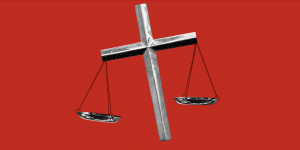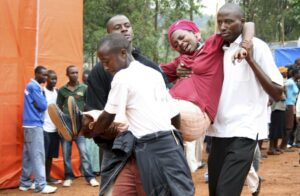Through the Russia-Ukraine conflict, Europe has been rediscovering the values of the continent’s half-forgotten legacy.
In addition to fear and horror, the war in Ukraine during its first weeks awakened a strange feeling of self-confidence in Europe. “Solidarity with Ukraine makes democracy cool again,” the Serbian activist Srdja Popovic told the French newspaper Liberation on March 23. Vladimir Putin, through his rhetoric, indiscriminate bombing, and civilian massacres, has taken on a role much bigger than that of an old-fashioned tyrant: that of an openly fascist stateman. At last, after decades of false alarms, the first real one of his kind in Europe in 80 years. And somehow, perhaps because we’d been expecting a leader like him for so long, it also sounded to some like reinvigorating news.
During the Balkan War of the early ’90s, Popovic opposed the Serbian strongman Slobodan Milošević with what he called “laughtivism,” using mockery against power. He stood in a tradition of the weak fighting against the strong, the dreamers riding against the men of action, as Leonard Cohen used to sing during that same decade—a tradition that Václav Havel called, in his essay condemning Communist totalitarianism, “the power of the powerless.”
This tradition seems to have been taken up by Ukrainian President Volodymyr Zelensky, the Jewish former comedian who now defies the brutal force of Russia. Half consciously, half irrationally, Zelensky’s Jewishness adds to the sense that he stands within a whole Mitteleuropean tradition of satire, fueled by the most anarchic tendencies of Yiddishkeit. He is practicing the art honed by Kafka, Chaplin, and Brecht, and taken up by Kundera, Norman Manea, and the ones we once called the dissidents.
Isn’t that what made Zelensky speak to the Knesset the way he did, calling out the memory of the Shoah to try to force Israel’s solidarity, presenting Ukraine—Ukraine, land of the Cossacks! Ukraine, which saw some of the worst pogroms in European history!—as a country that saved the Jews from Hitler? Whether this revision of history was a form of denial, or the price to pay for Ukraine’s shift toward democracy that started with the Orange Revolution in 2004, was almostimpossible to decide.
Through the conflict, Europe has been rediscovering the values of the continent’s half-forgotten legacy. In France, the Russian invasion has appeared to serve as a long-awaited reality check. Morosity, self-doubt, and the populist politics they empower have briefly seemed to be declining. Families have accepted Ukrainian refugees into their houses and apartments in an unexpectedly warm welcome—unseen, to say the least, during the Syrian-refugee crisis—that destabilized the far right’s campaign of xenophobia. And as has been noted before, NATO, declared “brain-dead” by French President Emmanuel Macron as recently as 2019, seems on its way to resurrection. Europe is not alone anymore, the United States is isolationist no longer, the West is back, things make sense again. This is a war of good against evil, truth against lies, a war fought many times over before in Europe, from Barcelona to Sarajevo. How can we lose? How can Putin ever win?
And there may be something in all of this. But isn’t it also a little too beautiful to be true? In March, in an apt illustration of this mindset, the French philosopher Bernard-Henri Lévy posted photos on Twitter showing him walking the streets of Odesa. In a theoretically more dignified documentary format, he also filmed himself tagging the French motto “Liberté, égalité, fraternité” on a wall. In itself, this act does not suffice to undermine the cause it purports to defend—civilians fighting for their lives and country have other fish to fry anyway—but shouldn’t it give us pause?
The first war of intellectuals—the first in Europe where the line between right and wrong was crystal clear—was the Spanish Civil War of the 1930s, in which Lévy’s father actually fought. Not coincidentally, it was also the first media war, with facts and images distorted by both camps in the name of ideas. The photographers who shaped our modern vision of what the news is supposed to be, like Robert Capa and Joris Ivens, staged their pictures to make them more romantic and more heartbreaking—truer. Writers such as André Malraux and Ernest Hemingway misled readers about what they saw and did. And the war also produced George Orwell, the first, perhaps, to understand the full implications of this new mixture of real events, serious ideas, media technology, communication, and narcissism. “If thought corrupts language, language can also corrupt thought,” he famously wrote in “Politics and the English Language,” published at the dawn of the Cold War.
During that Cold War, in Eastern Europe, this concern for true words versus politics was kept alive by dissident writers and thinkers—Jan Patočka, Danilo Kiš, Ivan Klíma—as well as by their counterparts in the West such as Albert Camus and Arthur Koestler. Then, as soon as the Soviet Union fell, the books of the dissidents that circulated widely in samizdat in the East largely ceased to be read. The last great moment of the West was probably 1990. That year Havel, the dissident and playwright, was elected president of Czechoslovakia, and two of his first moves were to appoint Frank Zappa as cultural ambassador of his country and invite the Rolling Stones to Prague. The concert they gave soon turned into a legendary event. For a while, it seemed that high and low Western culture could mix and shape the democratic future of the new global world rising on the ruins of totalitarianism.
Can this confidence be reestablished, after 9/11 and the Iraq War? After we discovered that the entity called the West was more fractured than anyone had thought, after the notion of a common reality was challenged? After the former dissidents left the stage or were disqualified because of their politics, and the old literary culture gave way to the digital age?
Odesa may have been Isaac Babel’s hometown, but if you look for genuine testimony as to what the Ukrainian population is now enduring, you will find it primarily on TikTok and Instagram. Self-branding and its visual and audio codes of communication are replacing the poems and prose that, in the 20th century, described the horrors of war. In that sense, and in that sense only, BHL’s photos of his thaumaturge-like silhouette pacing the streets of Odesaare fitting.
And so is Zelensky’s not-too-subtle talent for instrumentalizing the cultural tropes of the countries he addressed during his virtual world tour last month: in Israel, the Shoah; in Rome, preservation of European holy cities; in Berlin, the shadow of the wall erected “in the middle of Europe between freedom and slavery”; in D.C., Pearl Harbor; and at the French Parliament, incredibly enough, the actor Jean-Paul Belmondo, whose memory is apparently considered more meaningful, by Zelensky’s spin doctors, than that of the Resistance fighters.
Today’s hollow clichés replace yesterday’s lyrical calls to bravery. And the question hovering over Zelensky—who hosted a remarkably gross popular TV show for years, then played a high-school teacher who was elected president before actually becoming president—is whether his form of laughtivism belongs to the tradition of Chaplin or to the post-literary society of spectacle. The least that can be said about his performance at the Grammys is that it does not point to the first answer. And yet he has exhibited real heroism, choosing to remain in Kyiv rather than become a president in exile. That is the irony of the tragic situation. Having played the part of president for so long in peacetime, what choice did he have but to inhabit it for real once the war came?
Koestler once wrote that to fight against totalitarianism is not to fight for the truth against the lie but rather to fight “against a total lie in the name of a half-truth.” The half-truths of the West have nurtured anti-liberal tendencies for decades. It is their exact nature that we should be lucid about if we want to prevent populist forces from rebounding.
In France, since the end of the Cold War especially, the futility of the West has been seen as its cardinal sin—the symptom of its decadence. Critics of Macron view him as a bourgeois child of the naive ’90s and the decade’s emphasis on publicity, narcissism, and spectacle; until a few weeks ago, these same critics on the far-right and the left publicly admired Putin as a real man. Chief among them was Marine Le Pen, probably the most popular political figure in France today, who promises Frexit and peace with Putin if she is elected president in two weeks. As of this writing, Macron’s poll numbers keep declining while he wages a superficial and hubristic campaign.
And not just in Paris has the Russian president found admirers. In Hungary and in Serbia, Viktor Orbán and Aleksandar Vučić have been reelected this month on pro-Russian tickets. In Algeria, as the writer Kamel Daoud reminded me when we spoke last week, Islamist columnists support Putin’s “strength” because it contrasts with the alleged “feminization” of the liberal West. So do, it seems, one-third of Africa, most of the Arab world, and Latin America: areas saturated with post-colonial, Cold War resentment.
Boosted by these opinions, and by his own propaganda, Putin, strangely enough, may face the same kind of image problem Zelensky confronts. Putin portrays himself as a besieged, virtuous leader defending Russia’s integrity and Christian manhood against Nazi plots and Western evil. This narrative finds its roots in the paranoid Eurasian ideology of half-lunatic writers such as Viatcheslav Volodine and Alexander Dugin. These men share with the Islamists a strange mix of absolute religious faith and complete nihilism that is one of the most baffling traits of our new century. For years Putin was able to balance their mad views with an apparently more pragmatic approach. He played the cruel neofascist czar or the modern statesman according to the circumstances and the people he was talking with.
But “language can … corrupt thoughts,” as Orwell put it, and thoughts create reality. We may never know all the reasons Putin chose to fully commit to the part of the Eurasian fascist. (The pass he received in Syria, where the strategy of terror deployed in Ukraine was first developed; the messy American withdrawal from Afghanistan, which led him to think he could act freely; his own isolation since the start of the coronavirus pandemic—all surely played some role.) He probably always believed in the narrative, at least partly. But by endorsing it, he has definitively brought us into a world in which sociopathic Dostoyevskian characters make the rules.
A war against civilians is terror, and terror is a language from which there is no way back. What makes the Russian soldiers act the way they did in Bucha—and tomorrow, elsewhere—is not known, but one hypothesis, given the bombings of civilian sites that preceded those crimes, is that they are following orders. “Madness alone is truly terrifying, inasmuch as you cannot placate it either by threats, persuasion, or bribes,” says Mr. Vladimir, the Russian attaché and terrorist instructor in Joseph Conrad’s The Secret Agent, a novel that should be reread today along with Dostoyevsky’s Demons. In other words, barbaric behavior sends a message of paradoxical seriousness that renders who loses and who wins a pointless question.
To what extent, then, does Putin need that kind of war in order to prove that he can make war? Each step toward more terror is a step away from any kind of credible negotiations. Any peace talk, after terror, appears like a surrender to brute force. Savagery is a test of the reality of Putin’s own threat—including the nuclear one—as well as the truth of our determination. And in the face of that, easy Western self-confidence won’t do. The time of reckoning is yet to come.
Our editors’ guide to what matters in the world, delivered to your inbox.




